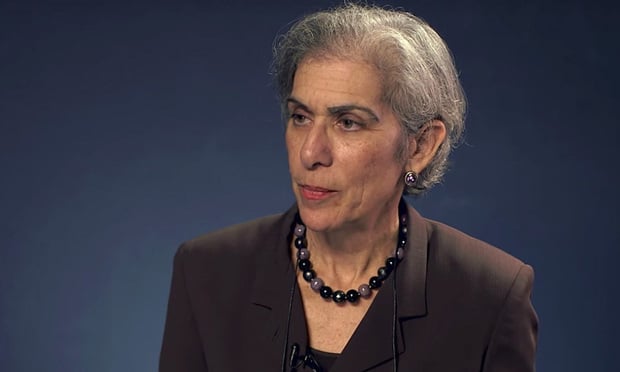Amy Wax Again Raises Ire of Penn Law Students With Immigration Comments
Students and alumni are asking administrators to take action against the law professor over her comments on immigration delivered at a national conference for conservatives that many view as racist.
July 19, 2019 at 02:04 PM
6 minute read
The original version of this story was published on Law.com
 Amy Wax. Courtesy photo.
Amy Wax. Courtesy photo.
More than 1,000 people, many of whom are University of Pennsylvania Law School students and alumni, have signed a petition calling for professor Amy Wax to be relieved of her teaching duties. The outcry comes after she reportedly told attendees at the National Conservative Conference this week that the United States should favor immigration from Western countries over others.
According to news reports—the accuracy of which the law professor disputes—Wax attributed an increase in litter to immigrants and said the country would be “better off” with more whites. In addition to the demand that Wax no longer teach, the petitioners have asked the school to denounce her latest comments and hire more minority professors into tenured positions.
“We acknowledge and appreciate the importance of intellectual diversity, but these statements are hateful and perpetuate dangerous, false stereotypes about our communities, our families and us,” read the petition, which was drafted by the school's Latinx Law Students Association and co-sponsored by a number of other campus affinity groups. “The effect of these statements, behind a thin veil of intellectual diversity, exacerbate a hostile environment at Penn Law that makes students like us feel like we do not belong.”
Penn Law spokesman Steve Barnes said in a prepared statement that Wax is “free to express her opinions” under the school's academic freedom and open expression policies. “It is also the case that views of individual faculty members do not represent the views of the institution, but rather their own personal beliefs,” Barnes said.
In an email Friday, Wax said the reaction from students is based on erroneous news reports about her comments at the conference.
“Have any of the people at Penn Law actually heard what I said at the conference?” she wrote. “Were any of them present? They are basing their hysteria on stories about stories about stories about what one very inattentive, sloppy journalist wrote about the panel. That is laziness, at best, or just the complete collapse of standards.”
Wax declined Friday to clarify the central argument she made on the panel, but pointed to her law review article titled, “Debating Immigration Restriction: The Case for Low and Slow,” which appeared last year in the Georgetown Journal of Law & Public Policy, as the basis for her talk.
That article argues that immigration policy should be considered from many angles, including the interest of voters and citizens alongside newcomers; nationalistic economic and cultural concerns; and the need for both border security and the integrity of the rule of law. In addition to calling for a more expansive debate over immigration policy, the article also includes commentary from Wax pertaining to what she views as a reluctance among immigrants to assimilate into American culture—along the lines of what has recently rankled her critics. Why would immigrants seek to come to the United States yet not take on its customs, she asks in the article:
One possibility is that they come to our country (or to the West generally) to take advantage of our wealth, our generosity and our stability. Then their choice would seem exploitative, a form of free riding on our attributes, with presumably no intent to contribute to or actively support and maintain them. Such a stance is ethically suspect and in bad faith. It is exploitative but also ungrateful to denigrate and disdain our institutions, stress the evils of our traditions, ignore our strengths and virtues, and yet insist on the “right” to mine the benefits our country offers.
This is not Wax's first brush with controversy. The conservative law professor, who has been on the Penn Law faculty since 2001, found herself at the center of firestorms in both 2017 and 2018 as a result of public comments that many people found to be racist and unfounded. She co-authored an opinion piece in The Philadelphia Inquirer with University of San Diego law professors Larry Alexander that argued that a breakdown of cultural norms from the 1950 and 1960s has weakened the Unites States. The piece singled out the “rap culture of inner-city blacks” and the growing “anti-assimilation ideas” among Hispanic immigrants as examples of negative trends.
The following spring, video surfaced of an earlier interview Wax had done in which she alleged that black students underperform at Penn Law—part of her argument case against affirmative action. “I don't think I've ever seen a black student graduate in the top quarter of the class, and rarely in the top half,” she told interviewer Glenn Loury, an economics professor at Brown University.
Penn Law students began to lobby the school to remove Wax from teaching first-year courses—which are assigned and mandatory—after the opinion piece. But administrators declined to do so until her comments about the performance of black law students circulated widely. Dean Ted Ruger refuted the claim that black students aren't successful at the law school and said Wax had violated confidentiality rules surrounding grades. As they are now, Penn Law students at the time submitted a petition calling on the school to disavow Wax's comments.
The current student petition also asks Penn Law to mandate diversity, bias and sensitivity training for students and faculty and that Dena Ruger and Penn's Office of Affirmative Action and Equal Opportunity Programs meet with the law school's affinity groups at the start of the school year. In addition to the Penn Law and alumni, it has been signed by a wide array of student organizations from other law campuses, including Harvard Law School, the University of Virginia School of Law, and Duke Law School.
“At Penn Law, diversity should not be a conversation that only emerges when Professor Wax uses the cover of her tenure to spew racist, anti-intellectual comments,” the petition reads. “Diversity should be an ongoing dialogue that gains momentum through administration-sponsored events and a fully-developed diversity action plan that our classmates demanded two years ago.”
This content has been archived. It is available through our partners, LexisNexis® and Bloomberg Law.
To view this content, please continue to their sites.
Not a Lexis Subscriber?
Subscribe Now
Not a Bloomberg Law Subscriber?
Subscribe Now
NOT FOR REPRINT
© 2025 ALM Global, LLC, All Rights Reserved. Request academic re-use from www.copyright.com. All other uses, submit a request to [email protected]. For more information visit Asset & Logo Licensing.
You Might Like
View All
Pa. Superior Court: Sorority's Interview Notes Not Shielded From Discovery in Lawsuit Over Student's Death
3 minute read
LSAT Administrator Sues to Block AI Tutor From Using ‘Famous, Distinctive’ Test Prep Materials
3 minute read
Disjunctive 'Severe or Pervasive' Standard Applies to Discrimination Claims Against University, Judge Rules
5 minute readTrending Stories
Who Got The Work
J. Brugh Lower of Gibbons has entered an appearance for industrial equipment supplier Devco Corporation in a pending trademark infringement lawsuit. The suit, accusing the defendant of selling knock-off Graco products, was filed Dec. 18 in New Jersey District Court by Rivkin Radler on behalf of Graco Inc. and Graco Minnesota. The case, assigned to U.S. District Judge Zahid N. Quraishi, is 3:24-cv-11294, Graco Inc. et al v. Devco Corporation.
Who Got The Work
Rebecca Maller-Stein and Kent A. Yalowitz of Arnold & Porter Kaye Scholer have entered their appearances for Hanaco Venture Capital and its executives, Lior Prosor and David Frankel, in a pending securities lawsuit. The action, filed on Dec. 24 in New York Southern District Court by Zell, Aron & Co. on behalf of Goldeneye Advisors, accuses the defendants of negligently and fraudulently managing the plaintiff's $1 million investment. The case, assigned to U.S. District Judge Vernon S. Broderick, is 1:24-cv-09918, Goldeneye Advisors, LLC v. Hanaco Venture Capital, Ltd. et al.
Who Got The Work
Attorneys from A&O Shearman has stepped in as defense counsel for Toronto-Dominion Bank and other defendants in a pending securities class action. The suit, filed Dec. 11 in New York Southern District Court by Bleichmar Fonti & Auld, accuses the defendants of concealing the bank's 'pervasive' deficiencies in regards to its compliance with the Bank Secrecy Act and the quality of its anti-money laundering controls. The case, assigned to U.S. District Judge Arun Subramanian, is 1:24-cv-09445, Gonzalez v. The Toronto-Dominion Bank et al.
Who Got The Work
Crown Castle International, a Pennsylvania company providing shared communications infrastructure, has turned to Luke D. Wolf of Gordon Rees Scully Mansukhani to fend off a pending breach-of-contract lawsuit. The court action, filed Nov. 25 in Michigan Eastern District Court by Hooper Hathaway PC on behalf of The Town Residences LLC, accuses Crown Castle of failing to transfer approximately $30,000 in utility payments from T-Mobile in breach of a roof-top lease and assignment agreement. The case, assigned to U.S. District Judge Susan K. Declercq, is 2:24-cv-13131, The Town Residences LLC v. T-Mobile US, Inc. et al.
Who Got The Work
Wilfred P. Coronato and Daniel M. Schwartz of McCarter & English have stepped in as defense counsel to Electrolux Home Products Inc. in a pending product liability lawsuit. The court action, filed Nov. 26 in New York Eastern District Court by Poulos Lopiccolo PC and Nagel Rice LLP on behalf of David Stern, alleges that the defendant's refrigerators’ drawers and shelving repeatedly break and fall apart within months after purchase. The case, assigned to U.S. District Judge Joan M. Azrack, is 2:24-cv-08204, Stern v. Electrolux Home Products, Inc.
Featured Firms
Law Offices of Gary Martin Hays & Associates, P.C.
(470) 294-1674
Law Offices of Mark E. Salomone
(857) 444-6468
Smith & Hassler
(713) 739-1250






